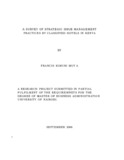| dc.description.abstract | The objective of this study was to establish strategic issue management practices by
classified hotels in Kenya while identifying factors influencing strategic issue
management practices in the hotel industry. The study is fundamental because
strategic issue management has continued to evolve and in less than three decades
(after 1970s) issue management has become an established as a distinct business
discipline with proven capacity to add strategic value to organizations.
The study will be of benefit to the managers and practitioners in the hotel industry,
the government and policy makers and the scholars. A descriptive survey method was
used to collect data from the entire population. However out of the 47 hotels, only 35
responded by returning the questionnaire. The primary data was collected using "the
drop and pick method". In each hotel the general manager was requested to fill the
questionnaire. However, if absent, a suitable replacement such as the deputy general
manager was requested to fill on his-behalf
From the survey, it was clear that the three star hotels responded better than the other
cluster at 40 %. Due to the changes in the global arena, it has been noted that the
hotels have started realising the importance of strategic issue management as a tool to
maximizing their profitability margins. They are not only applying strategic planning
tools in their scope of operations but also incorporating the strategic issue
management concept to resolve urgent and critical issues. However, there seem to be
lack of clarity in this area of management due to lack of proper training. The results of
the survey indicated that issue management has more to offer in this industry. The
current rating is oscillating in the range of 51 % to 55% on the importance attached on
strategic issue management.
For strategic issue management to take have a firm ground, resource mobilisation is
inevitable. This match allows the company to align itself strategically as the
environment changes. The top management will have to take a more proactive role in
issue resolution, work hand in hand with the shareholders in the provision of
resources and offer guidance to the issue teams. This is expected to push strategic
issue management a notch higher. | en |

